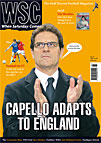 Futsal has become a professional game in some countries and improves the basic skills of players but England is still not interested, writes Jon McLeod
Futsal has become a professional game in some countries and improves the basic skills of players but England is still not interested, writes Jon McLeod
It is the game that produced Ronaldinho and Cristiano Ronaldo. Yet despite it having fostered some of the world’s finest talents with skill, ingenuity and tactical astuteness, England has neglected futsal. From its constricted origins on the streets of São Paulo and Montevideo in the 1930s, this five-a-side version of football has spread throughout Europe and the Middle East and across the rest of Asia. In 1989 FIFA confirmed it as the official small-sided form of the game and, in the internet age, players such as Brazil’s Falcão (aka Alessandro Rosa Vieira) are becoming YouTube regulars, rivalling the most flamboyant exponents of 11-a-side football.